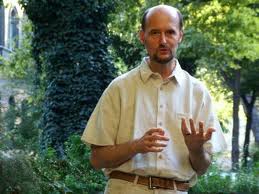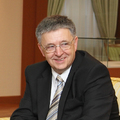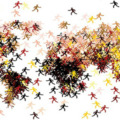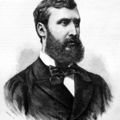World Science Forum 2011. Day 2/4 - New generation of science and researchers
18. November, 11:30 Youth-ways session on Scientific collaboration in the changing landscape of science: new generation of science and researchers
A szekció a kutatók új nemzedékével foglalkozott. "A fiatalokról, a fiatalok által egyre inkább használt internetről, a világháló által biztosított demokratikus lehetőségekről szólt ez az ülés. Sokan tesznek azért, hogy ezek a lehetőségek a tudomány területén is biztosítottak legyenek" - nyilatkozta Csermely Péter hálózatkutató, a Nemzeti tehetségsegítő Tanács elnöke. "Számos olyan hálózatot mutattak be, amelyek révén az emberek követhetik az eseményeket, s a saját környezetükben lévő történésekről tudósítsanak. Ezáltal olyan dolgokat osztanak meg másokkal, amelyek eddig elzártak voltak. Ez igaz a tudomány területére is."
Két előadás a tudományos eredmények közösségi oldalakon való közzétételét, értékelését és mindemellett a személyiség megtartását egyszerre mutattak be.
Chair 1: Henry Roman Chairman, WAYS Africa.

Chairman, WAYS Africa
Henry Roman is a former student of the Nelson Mandela Metropolitan University (MSc Biochemistry) and Rhodes University (PhD Biotechnology), both in the Eastern Cape, South Africa. In 2005 he started a post-doc in the division Biosciences, CSIR, South Africa. He left the CSIR as a Projects Manager in 2008 to join Metago Engineering Services, an environmental consultancy as a Scientist. Henry has an active interest in the bioremediation of acid mine drainage, and the environmental health of South Africa's water resources.
In 2007 he was elected Chairperson of WAYS Africa. He currently serves on the Management Committee of the Young Water Professionals of Southern Africa and is a registered professional scientist with SACNASP.
Chair 2: Mandë Holford Assistant Professor, CUNY-York College and the Graduate Center, Inaugural member, WAYS
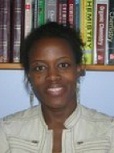
Assistant Professor, CUNY-York College and the Graduate Center
Inaugural member, WAYS
Dr. Mandë Holford is as an Assistant Professor in Chemistry at The CityUniversity of New York-Hunter College and Graduate Center, with ascientific appointment at the American Museum of Natural History. Her interdisciplinary research combines chemistry and biology to characterizevenomous marine snails and analyze their peptide toxins as tools formanipulating cell signaling in the nervous system. In 2011 she was awardedan NSF CAREER Award, and named a 21st Century Chemist in the NBC-Learn, Chemistry Now series. She is an inaugural member of the World Academy ofYoung Scientist (WAYS), an organization sponsored by UNESCO and The Academy of Sciences for the Developing World (TWAS). She served on the Advisory Committee for Term Members of the Council on Foreign Relationsand was recently selected to the Educational Affairs Committee of the Board of Trustees of The Rockefeller University. Dr. Holford received her PhD in Synthetic Protein Chemistry from The Rockefeller University.
Kevin Govender Director, Global Office of Astronomy for Development, South Africa
Thirty-two-year-old Kevin Govender has long observed how science changes lives. And now, as the first director of the International Astronomical Union's Global Office of Astronomy for Development, Govender finally has the mandate to make things happen for developing nations.
That's a very big deal. It's the first office in the world for development in the field of astronomy. Take into account all the education outreach projects Govender helped during his five years at National Energy South Africa, add the socioeconomic benefits he enabled during his time as manager of the Southern African Large Telescope's (SALT)'s collateral benefits division and multiply it by the 800-million people he and his team reached through lobbying for the International Year of Astronomy and you might get an idea of how Govender feels about his new developmental role - over the moon.
Linda Kamau - Ushahidi, Kenya, Vice President at Akirachix

Linda Kamau is a software developer based in Kenya with a degree in Business Information Technology. She develops both web and mobile applications. Before joining Ushahidi, Linda worked as a software developer with IT firms such as Ibidlabs, Ltd. and Mobile Pay, Ltd.
When not doing what she loves most (coding), she enjoys outdoor activities like camping. She is also a die hard Man U fan and can often be found watching the latest football match.
Humphrey Oborah - resident, African Council of Gifted and Talented, Kenya
Prof. Dr. Humphrey Oborah was born along the shores of Lake Victoria (Kenya) to peasant African farmers who could only manage one meal per day. His father had to go
fishing in Lake Victoria while himself, the mother and his younger siblings would tend to the farms. He started school at the age of 4, but did extremely well in Primary School, which was a typical Kenyan Rural School made of iron sheet roof and earthed walls. In such schools, students would sit on the floor and almost noone had shoes.
In his Bachelors Degree he studied Mathematics, Computer Science and Meteorology.
His PhD (St. John’s Curriculum Institute, Cambridge) involved research on Electronic Curriculum (e-curriculum) with a bias to Gift and Talent Testing (GnT). He researched
extensively on Early Childhood Education especially pedagogy and cognitive skills bridging with e-curriculum and GnT before becoming a professor in the same discipline in 2008.
Perhaps his biggest achievement is having been elected as the first President of The World Council for Gifted and Talented – Africa (www.giftedafrica.com), which is an affiliate of The World Council for Gifted and Talented Children (www.world-gifted.org). In this regard, he was instrumental in bringing home the first mini conference in Gifted and Talented in Nairobi, Kenya 26th March 2010, which was attended by a significant delegation from The World Council for Gifted and Talented and Kenya Government authorities.
He has published a number of moving 21st century educational research articles and he is also a member of a number of local and international organizations, most importantly being the first President of The Council for Gifted and Talented in Africa.
Prof. Oborah assisted many Orphaned Children Homes and Schools for the poor in Kenya. He has specifically assisted people in great need.
Francois Taddei  - Research Scientist, INSERM, Paris, France
- Research Scientist, INSERM, Paris, France
François Taddei heads the Evolutionary Systems Biology team at a unit of the French National Institute of Health & Medical Research (INSERM) in Paris-Descartes University’s Medical School. After a generalist scientific education, with majors in physics and biology at the École Polytechnique, he became a tenured higher civil servant at the French Ministry of Agriculture,
before earning a PhD in genetics, studying the molecular causes and evolutionary consequences of changes in the mutation rate with Miroslav Radman. After postdoctoral training with John Maynard-Smith where he modeled the evolution of mutation rate, for the last 12 years, his research team has been studying the evolution and molecular mechanisms of cooperation, genetic changes, errors in gene expression, pathogenicity, antibiotic resistance and aging in E. coli. He pioneered the study of aging in this model bacteria and is trying to unravel its mechanisms using microfluidics and systems biology approaches. This work has produced many publications in generalist scientific journals, and has been recognized by several awards, (the European Young Investigator award, the Human Frontier Science Program award, the INSERM Award for Fundamental Research, and the Liliane Bettencourt Life Science Award).
Passionated by education, over the last seven years, he has created the CRI (Center for Research and Interdisciplinary dedicated to foster the new generation of scientists working at the interfaces) in the heart of Paris, which offers 3 programs integrated in the Liliane Bettencourt curriculum. CRI’s main role is to promote new pedagogies to help creative students take initiatives and develop their research projects, with the help of mentors, research institutions, private companies (FT was recipient of research chairs funded by Orange and Axa), and foundations, such as the Bettencourt Foundation, which has supported many student-created activities. These activities range from the first French synthetic biology team (which won 3 awards in 4 participations in the MIT-sponsored iGEM competition) to the "Paris-Montagne" science festival and the "Science Académie," an outreach program that allows high schools students from disfavored neighborhoods to discover the creativity of science while spending their vacations in research labs. To foster even more initiatives, the CRI is currently helping the creation of an incubator for innovators in science education. François Taddei has been involved in scientific committees for the NIH, the INSERM and the ministry of research and served as advisor for the french government, the European Union and the OECD that asked him to write a report on the future of education in the 21st century.
Victor Henning  CEO and founder Mendeley Limited, London, UK
CEO and founder Mendeley Limited, London, UK
Victor is the co-founder and CEO of Mendeley. Max Planck famously said: "Science progresses funeral by funeral". At Mendeley, Victor is trying to find gentler methods for advancing science.
Victor holds a Ph.D. from the Bauhaus-University of Weimar, where he researched the role of emotion in consumer decision making. After making it through the customary process of being clubbed like a baby seal, i.e. "peer review", his research was published in the Journal of Marketing and in Media, Culture & Society. In his first year as a Ph.D. student, he also won the Overall Best Conference Paper Award at the largest academic conference in the field of marketing, the AMA's 2005 Summer Conference in San Francisco - and was told by the conference chair that his academic career could only go downhill from there. Nonetheless, the Foundation of the German Economy kindly decided to grant him a doctoral dissertation scholarship in 2006, and the Royal Society of Arts elected him a Fellow in 2011.
At the Bauhaus-University, Victor was also frequently cast in student short films, despite a visible lack of acting talent. He compensated by organizing the "Guru*Talk" lecture series with German film industry luminaries, which was later turned into a book on the future of the film industry, and consulted for film production companies. Prior to having had all this fun, he completed an MBA at the WHU Koblenz, the Université Libre de Bruxelles, and the Handelshøyskolen BI Oslo.
Victor has also worked as a Talent Scout A&R for Sony Music/Columbia Records in Berlin, and in various roles at punk/garage label Revelation Records in Huntington Beach, California. Realizing that one couldn't make a living with the music he loved, he moved on to Munich-based film producer/distributor Helkon Media, which promptly went bankrupt (not Victor's fault). Later, in parallel to writing his MBA thesis, he also co-founded the Korova Bar in Vallendar which, if nothing else, taught him how to use dangerous power tools.
Kaitlin Thaney  Manager, External Partnerships, Digital Science, London, UK
Manager, External Partnerships, Digital Science, London, UK
"I work for 'Digital Science', a new technology company out of Macmillan Publishers that provides state-of-the-art tools and software to enable better science. I'm the Manager of External Partnerships, a long title that involves developing and managing business leads, as well as serving as the spokesperson for the company - sometimes referred to as "evangelism" in the tech world.
I come from the open science world, most recently serving as the manager of the science division of Creative Commons (formerly known as "Science Commons"), where I also worked on making research more efficient, but through licensing hacks, policy and infrastructure. My time at Creative Commons introduced me to the socio-cultural nuances that can oftentimes be the most obstinate in the research world (and also the least talked about) - factors that are key to understanding how researchers interact with technology - or on the flip side, don't. In my current role at Digital Science, I continue that work but instead focussing on technology solutions to help researchers and decision makers do better science and administration.
Previous lives include print journalist (funny enough as we prep for a conference with ties to science communication), First Amendment/freedom of information advocate, education technologist, and licensing (/data sharing) nerd. Each of those experiences have helped shape my current drive to change the way science (and science administration) is done."
Péter Csermely President, Hungarian National Talent Support Council
"As an ordinary biochemist, I have started to recognize the strength of the network approach only in 2002. This was the time, when I became increasingly aware of the need for a novel concept to analyze the massively growing set of genomics and proteomics data, and I recognized the special role of my original subject, molecular chaperones in the organization of the whole cell. Chaperones are typical weak linkers providing a large number of promiscuous contacts to stabilize network structures both at the level of individual proteins and cellular networks. In 2005 and 2006 we recognized that weak links have a wastly different meaning, if they are intra-modular or inter-modular structures. During these studies we were able to identify a special set of network elements, called VIP-elements or creative elements. Currently I am working on the role of weak links in the interaction scenarios (dynamic equilibria, games) between network partners."
World Science Forum 2009 - Csermely Péter előadása
A kiválóság határai: a mindennapi munka dicsérete Avagy: Hogyan gazdagíthatja a tehetség igazán az összképet?
Az igazi tehetség kivételes alkotásokkal és viselkedéssel véteti észre magát. Hányszor és mennyire kivételesek egy tehetség mindennapjai? Mikor és meddig hasznos ez a kivételesség? Összeegyeztethető-e a zavarba hozóan új a harmóniával? Kell nekünk ez a luxus egy válság közepén? Érték-e az, ami nem kivételes?
A válasz kettős. A kivételességre éppen hogy egy válság közepén van a legnagyobb szükség. A válságot teremtő új helyzet új megoldásokat kíván. Az a kreativitás, ami a szokásos körülmények között azért is luxus, mert nem megbízható, egy válságban a csoport életbiztosítása lesz.
Ugyanakkor a legtöbb tehetség, a legtöbb kivételes alkotás kibontakoztatása „szürke” munkával teli napok ezreit igényli. A kivétel csak egy patikamérlegen meghatározott arányban gazdagítja az összképet a legjobban. Ez az a skálafüggetlen arány, amelyet a hálózatok vonatkozásában Barabási Albert László jellemzett először. Tízszer kivételesebb viselkedésből pontosan tizedannyi kell ahhoz, hogy a harmónia fennmaradjon. A mindennapi, tisztességes, minőségi munka nélkül nem alakulhat ki az a harmónia, ami nélkül csoda teremhet ugyan, de tartós jóérzés soha.
World Science Forum 2011
Csermely Péter beszámolt arról, hogy a Magyar Géniusz Program két éves tevékenysége során huszonhatezer fiatal tehetséget fedezett fel. Kifejtette: nagyon sok fiatal kilóg az iskolai rendszerből, különösen a legjobbak, nekik is szükséges a segítség. A magányos tehetség hátrányos helyzetben van, ha képességeit tudásának megfelelően szeretné kamatoztatni. Nagyon korán fel kell figyelni azokra a fiatalokra, akik az átlagnál érdeklődőbbek, mélyebben gondolkodóbbak és segíteni kell őket abban, hogy a képességeiket meg tudják őrizni. Ebben segíthetnek a hálózatok: a tanárok, vagy a mentorok hálózatai, vagy a világháló.
Csermely Péter felhívta a figyelmet arra, hogy az év végével lezáruló Géniusz-programmal nem fejeződik be a Nemzeti Tehetség Program megvalósítása. Üdvözölte azokat a kormányzati döntéseket, melyek értelmében a tehetséges fiatalokat támogató programok a jövőben is számíthatnak támogatásokra.

